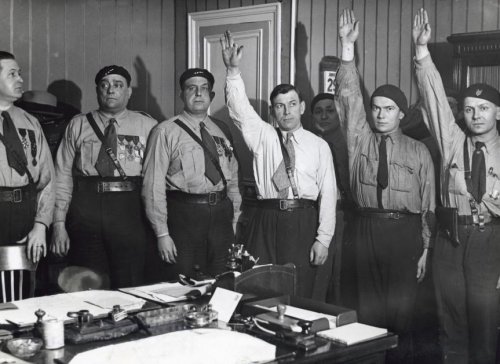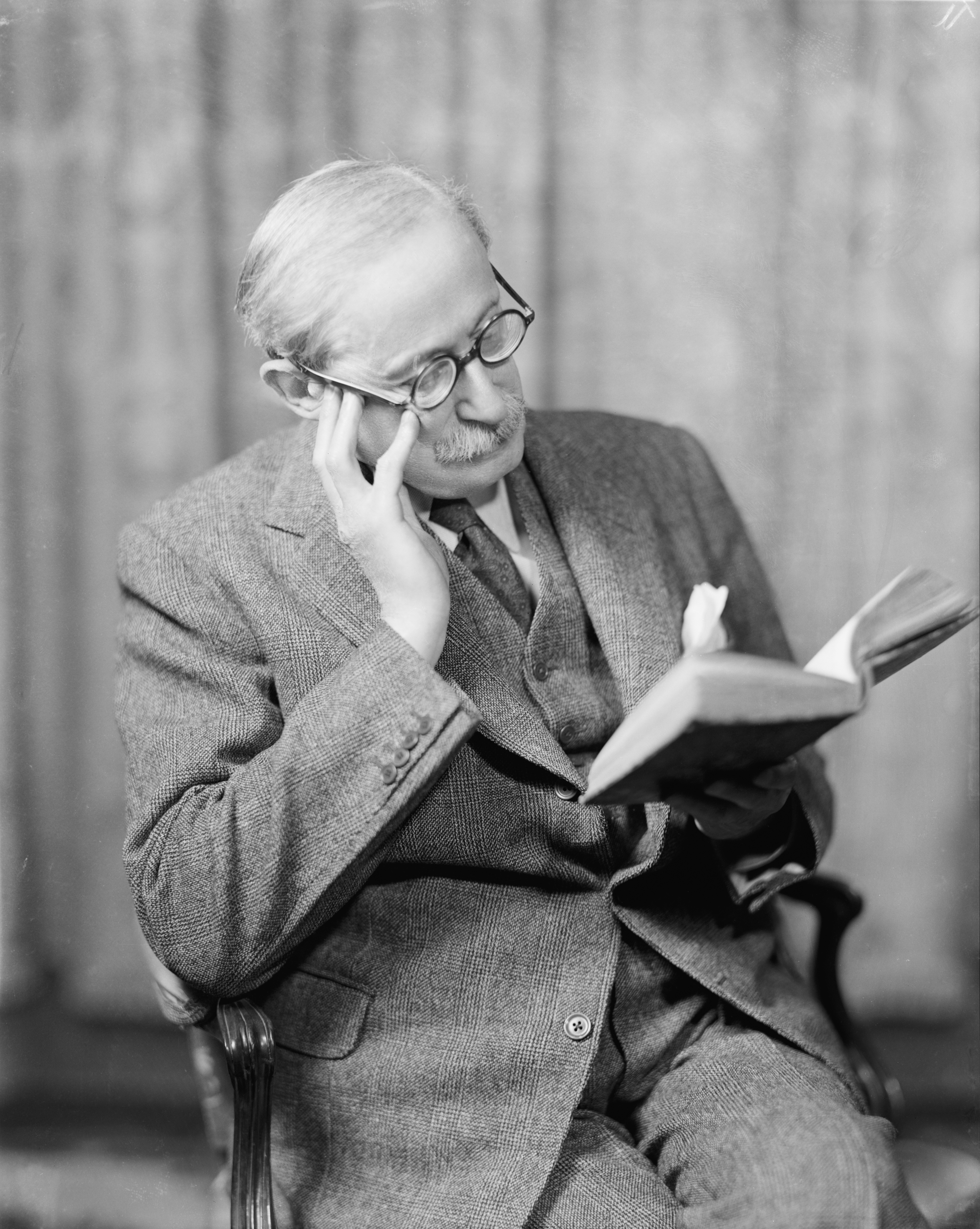|
Francistes
The Francist Movement (french: Mouvement franciste, MF) was a French Fascist and anti-semitic league created by Marcel Bucard in September 1933 that edited the newspaper ''Le Francisme''. Mouvement franciste reached a membership of 10,000 and was financed by the Italian dictator, Benito Mussolini. Its members were deemed the ''francistes'' or ''Chemises bleues'' (''Blueshirts''), and gave the Roman salute (a paramilitary character that was mirrored in France by François Coty's Solidarité Française). It took part in the Paris protests of 6 February 1934 during which the entire far right (from Action Française to Croix-de-Feu) protested the implications of the Stavisky Affair and possibly attempted to topple Édouard Daladier's government. It incorporated the Solidarité française after Coty's death later in the same year. All of the movements that participated in the 6 February riots were outlawed in 1936, when Léon Blum's Popular Front government passed new legislation o ... [...More Info...] [...Related Items...] OR: [Wikipedia] [Google] [Baidu] |
Marcel Bucard
Marcel Bucard (7 December 1895 – 13 March 1946) was a French Fascist politician. Early career A decorated soldier who earned a reputation for bravery in World War I, Bucard became active in politics after 1918, initially as a member of ''Action française'', an integralist monarchist far-right group, and later as a member of the overtly-fascist and anti-Semitic ''Faisceau'' of Georges Valois. In September 1933, Bucard founded his own group, the ''Mouvement franciste'', which was arguably the most extreme group and was financed by Benito Mussolini's government. During the 6 February 1934 crisis, the ''Francistes'' joined the other right-wing parties in the protests and riots in front of the Palais Bourbon provoked by the Stavisky Affair and accused of being intended as a coup d'état. In 1936, the new Popular Front government banned his movement and all other right-wing "leagues", fascist or otherwise, and Bucard was briefly imprisoned. His attempt to recreate the movemen ... [...More Info...] [...Related Items...] OR: [Wikipedia] [Google] [Baidu] |
Far Right League
The far-right leagues (french: ligues d'extrême droite) were several French far-right movements opposed to parliamentarism, which mainly dedicated themselves to military parades, street brawls, demonstrations and riots. The term ''ligue'' was often used in the 1930s to distinguish these political movements from parliamentary parties. After having appeared first at the end of the 19th century, during the Dreyfus affair, they became common in the 1920s and 1930s, and famously participated in the 6 February 1934 crisis and riots which overthrew the second ''Cartel des gauches'', i.e. the center-left coalition government led by Édouard Daladier. For a long time, the French left wing had been convinced that these riots had been an attempted ''coup d'état'' against the French Republic. Although contemporary historians have shown that, despite the riots and the ensuing collapse of the governing left wing, there had been no organized plans to overthrow Daladier's Radical-Socialist go ... [...More Info...] [...Related Items...] OR: [Wikipedia] [Google] [Baidu] |
Popular Front (France)
The Popular Front (french: Front populaire) was an alliance of French left-wing movements, including the communist French Communist Party (PCF), the socialist French Section of the Workers' International (SFIO) and the progressive Radical-Socialist Republican Party, during the interwar period. Three months after the victory of the Spanish Popular Front, the Popular Front won the May 1936 legislative election, leading to the formation of a government first headed by SFIO leader Léon Blum and exclusively composed of republican and SFIO ministers. Blum's government implemented various social reforms. The workers' movement welcomed this electoral victory by launching a general strike in May–June 1936, resulting in the negotiation of the Matignon Agreements, one of the cornerstones of social rights in France. All employees were assured a two-week paid vacation, and the rights of unions were strengthened. The socialist movement's euphoria was apparent in SFIO member Marceau Pi ... [...More Info...] [...Related Items...] OR: [Wikipedia] [Google] [Baidu] |
Léon Blum
André Léon Blum (; 9 April 1872 – 30 March 1950) was a French socialist politician and three-time Prime Minister. As a Jew, he was heavily influenced by the Dreyfus affair of the late 19th century. He was a disciple of French Socialist leader Jean Jaurès and after Jaurès' assassination in 1914, became his successor. Despite his relatively short tenures, his time in office was very influential: as Prime Minister in the left-wing Popular Front government in 1936–37, he provided a series of major economic and social reforms. Blum declared neutrality in the Spanish Civil War (1936–1939) to avoid the civil conflict spilling over into France itself. Once out of office in 1938, he denounced the appeasement of Germany. When Germany defeated France in 1940, he became a staunch opponent of Vichy France. Tried (but never judged) by the Vichy government on charges of treason, he was imprisoned in the Buchenwald concentration camp. After the war, he resumed a transitional lea ... [...More Info...] [...Related Items...] OR: [Wikipedia] [Google] [Baidu] |
Édouard Daladier
Édouard Daladier (; 18 June 1884 – 10 October 1970) was a French Radical-Socialist (centre-left) politician, and the Prime Minister of France who signed the Munich Agreement before the outbreak of World War II. Daladier was born in Carpentras and began his political career before World War I. During the war, he fought on the Western Front and was decorated for his service. After the war, he became a leading figure in the Radical Party and Prime Minister in 1933 and 1934. Daladier was Minister of Defence from 1936 to 1940 and Prime Minister again in 1938. As head of government, he expanded the French welfare state in 1939. Along with Neville Chamberlain, Benito Mussolini and Adolf Hitler, Daladier signed the Munich Agreement in 1938, which gave Nazi Germany control over the Sudetenland. After Hitler's invasion of Poland in 1939, Britain and France declared war on Germany. During the Phoney War, France's failure to aid Finland against the Soviet Union's invasion during the W ... [...More Info...] [...Related Items...] OR: [Wikipedia] [Google] [Baidu] |
Croix-de-Feu
, logo = Croix de Feu.svg , logo_size = 200px , leader1_title = President , leader1_name = François de La Rocque , foundation = 11 November 1927 , dissolution = 10 January 1936 , successor = French Social Party , headquarters = Rue de Milan, Paris , newspaper = ''Le Flambeau'' , student_wing = ''Groupes Universitaires'' , youth_wing = ''Fils et Filles de Croix-de-Feu'' , wing1_title = Paramilitary wing , wing1 = ''Volontaires Nationaux'' , wing2_title = Woman wing , wing2 = ''Sections Féminines'' , membership_year = 1936 , membership = 15,000 , ideology = French nationalism Social corporatism Proto-fascism , position = Right-wing to far-right , religion = Roman Catholicism , international = , colours = Black , country = France The Croix-de-Feu (, ''Cross of Fire'') was a nationalist French league of the In ... [...More Info...] [...Related Items...] OR: [Wikipedia] [Google] [Baidu] |
Action Française
Action may refer to: * Action (narrative), a literary mode * Action fiction, a type of genre fiction * Action game, a genre of video game Film * Action film, a genre of film * ''Action'' (1921 film), a film by John Ford * ''Action'' (1980 film), a film by Tinto Brass * ''Action 3D'', a 2013 Telugu language film * ''Action'' (2019 film), a Kollywood film. Music * Action (music), a characteristic of a stringed instrument * Action (piano), the mechanism which drops the hammer on the string when a key is pressed * The Action, a 1960s band Albums * ''Action'' (B'z album) (2007) * ''Action!'' (Desmond Dekker album) (1968) * ''Action Action Action'' or ''Action'', a 1965 album by Jackie McLean * ''Action!'' (Oh My God album) (2002) * ''Action'' (Oscar Peterson album) (1968) * ''Action'' (Punchline album) (2004) * ''Action'' (Question Mark & the Mysterians album) (1967) * ''Action'' (Uppermost album) (2011) * ''Action'' (EP), a 2012 EP by NU'EST * ''Action'', a 1984 al ... [...More Info...] [...Related Items...] OR: [Wikipedia] [Google] [Baidu] |
Far Right
Far-right politics, also referred to as the extreme right or right-wing extremism, are political beliefs and actions further to the right of the left–right political spectrum than the standard political right, particularly in terms of being radically conservative, ultra-nationalist, and authoritarian, as well as having nativist ideologies and tendencies. Historically, "far-right politics" has been used to describe the experiences of Fascism, Nazism, and Falangism. Contemporary definitions now include neo-fascism, neo-Nazism, the Third Position, the alt-right, racial supremacism, National Bolshevism (culturally only) and other ideologies or organizations that feature aspects of authoritarian, ultra-nationalist, chauvinist, xenophobic, theocratic, racist, homophobic, transphobic, and/or reactionary views. Far-right politics have led to oppression, political violence, forced assimilation, ethnic cleansing, and genocide against groups of people based on their supposed ... [...More Info...] [...Related Items...] OR: [Wikipedia] [Google] [Baidu] |
6 February 1934 Crisis
6 (six) is the natural number following 5 and preceding 7. It is a composite number and the smallest perfect number. In mathematics Six is the smallest positive integer which is neither a square number nor a prime number; it is the second smallest composite number, behind 4; its proper divisors are , and . Since 6 equals the sum of its proper divisors, it is a perfect number; 6 is the smallest of the perfect numbers. It is also the smallest Granville number, or \mathcal-perfect number. As a perfect number: *6 is related to the Mersenne prime 3, since . (The next perfect number is 28.) *6 is the only even perfect number that is not the sum of successive odd cubes. *6 is the root of the 6-aliquot tree, and is itself the aliquot sum of only one other number; the square number, . Six is the only number that is both the sum and the product of three consecutive positive numbers. Unrelated to 6's being a perfect number, a Golomb ruler of length 6 is a "perfect ruler". Six is a con ... [...More Info...] [...Related Items...] OR: [Wikipedia] [Google] [Baidu] |
Solidarité Française
Solidarité Française ("French Solidarity") was a French far-right league founded in 1933 by perfume manufacturer François Coty (1874-1934) as a "Parti national corporatif républicain". After Coty's death, it was commanded by Major Jean Renaud, members dressed in blue shirts, black berets, and jackboots, and shouted the slogan "''France for the French''". The movement claimed a strength of 180,000 in 1934, with 80,000 in Paris; the Parisian police thought the number in Paris closer to 15,000. The small membership did not however isolate the group: the Solidarité Française found itself integrated in the loose coalition of far right movements such as Action Française and Pierre Taittinger's Jeunesse Patriotes. The group gained notoriety during the rally and later riot during the 6 February 1934 crisis, in front of the Parliament seat in the Palais Bourbon. It was dissolved by a law adopted by the Popular Front government of Léon Blum in June 1936. Many members of ''Solidari ... [...More Info...] [...Related Items...] OR: [Wikipedia] [Google] [Baidu] |
François Coty
François Coty (born Joseph Marie François Spoturno in Corsica ; 3 May 1874 – 25 July 1934) was a French perfumer, businessman, newspaper publisher, politician and patron of the arts. He was the founder of the Coty perfume company, today a multinational. He is considered the founding father of the modern perfume industry. In 1904, his first success, fragrance ''La Rose Jacqueminot'' launched his career. He soon started exporting perfumes from France, and by 1910 he had subsidiaries in Moscow, London and New York. During the 1917 Russian Revolution, his assets in Moscow, which consisted of stocks and funds were confiscated by the Soviet government, making him a lifelong enemy of Communism. By the end of World War I, his financial success made him one of the richest men in France, allowing him to act as patron of the arts, collect works of art, historic homes and seek to play a political role. In 1922, he gained control of daily newspaper ''Le Figaro''. To check the grow ... [...More Info...] [...Related Items...] OR: [Wikipedia] [Google] [Baidu] |





